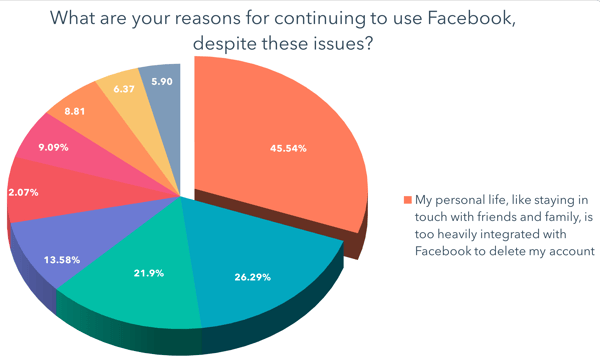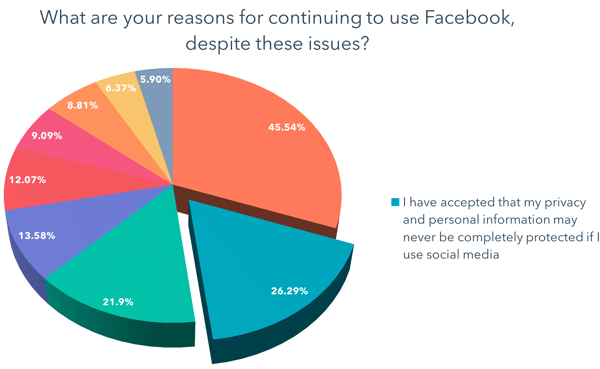The other day, I was scrolling through my Twitter feed, when one particular tweet caught my eye:

These Facebook revelations are outrageous, and I know user growth is flat. But is there any indication these damning stories are getting through to the general, non-technical public?
— Joe Bernstein (@Bernstein) December 19, 2018
The tweet's author, BuzzFeed News reporter Joe Bernstein, was seemingly reflecting upon the latest of over a year's worth of news reports about Facebook. It was a story from The New York Times detailing the access to personal user data provided by the social media giant to companies like Amazon, Microsoft, and Spotify -- and how it allegedly had done so to a far greater extent than it previously let on.
What Bernstein wanted to know, however, was how aware Facebook's 2.2 billion global users are of this report and those that preceded it -- the stories of how the network was weaponized by foreign actors to influence a presidential election, personal data was improperly harvested by a voter profiling firm, and how its CEO, Mark Zuckerberg, spent back-to-back days testifying on these issues (and others) to Congress.
And after many of these stories came to light, we asked people: Are you still using Facebook? Each time we asked, the answer was typically "yes."
Which is why Bernstein's question so starkly stood out to me. Sure, users have indicated to us previously their reasons for sticking around on Facebook -- but is it possible that they're also not as aware of these issues as those who study them day-to-day might be?
Here's what we found out.
A List of Issues
The "Question"
To get a sense of public awareness of Facebook's 2018 missteps, we ran a survey of over 700 people across the U.S., UK, and Canada. But it was a bit unconventional. Rather than asking people a yes-or-no question, we listed eight news items about Facebook from this year and lead each one with, "I would delete or deactivate my Facebook profile if ..."
We also added options to allow for people who have never used Facebook, or have already deleted/deactivated their accounts.
In all, the answer options were:
- I would delete or deactivate my Facebook profile if my private data was improperly harvested by a voter profiling firm
- I would delete or deactivate my Facebook profile if the company considered allowing advertisers to pay for access to my personal data
- I would delete or deactivate my Facebook profile if the company’s executives actively worked to hide issues from the public
- I would delete or deactivate my Facebook profile if current and former employees described the company as hostile toward people of color
- I would delete or deactivate my Facebook profile if there was abuse of the site by foreign actors to spread fake news and influence a presidential election
- I would delete or deactivate my Facebook profile if the company’s executives hired a PR firm to portray critics of the company in a negative light
- I would delete or deactivate my Facebook profile if there was abuse of the site by foreign actors to spread fake news and influence a presidential election, and the company lied about the extent to which this happened
- I would delete or deactivate my Facebook profile if several leaders across the company all left within only a few months
- None of these items would provide sufficient reason for me to delete or deactivate my Facebook account
- I have never had a Facebook account
- I have already deleted or deactivated my Facebook account, but for a reason other than those listed
- I have already deleted or deactivated my Facebook account for one of the above reasons
Then, we asked respondents to select any of the statements that they considered to be true. Remember: These were all actual news items about Facebook in 2018.
The Answers

Data collected with Lucid
Out of all respondents, 18% said that, despite these issues, they would keep their Facebook accounts.
Most picked at least one of the items on the list as being sufficient reason for them to delete or deactivate their Facebook profiles, including nearly half who said they would leave if their personal data was improperly harvested by a voter profiling firm -- which did, in fact, happen to 87 million users.
But only 5% of respondents said that they have deleted or deactivated their Facebook accounts as a result of the issues we listed, which raised the question: Are these respondents aware that these things actually happened?
"I think it’s based on the psychological principle of 'want' vs. 'should'," says HubSpot VP of Marketing Jon Dick. "Researchers have found that what people think they should do is different from that they actually do in actual situations."
The Perception Itself
A Vicious News Cycle
To further answer the question of user awareness, I'll look to further thoughts from Bernstein:
I guess I worry that all of this incredible, complicated reporting — which demands accountability — misses the people whom it affects and locks in a cycle of fact-finding, apology, and dog-and-pony congressional testimony signifying nothing
— Joe Bernstein (@Bernstein) December 19, 2018
As he points out, 2018 has been a year of a near-constant barrage of news headlines for anyone who spends any time online, and especially on social media, where the Pew Research Center says outpaces newspapers as a news source. And while many of those headlines have concerned Facebook -- see above -- they've appeared alongside a deluge of those concerning high-stakes national and global current events.
So while it's possible that these respondents did come across these stories, it's possible that they didn't pay attention to them for long -- or that there were simply so many of them that other news items dominated their time.
In fact, earlier this year, Pew ran a study to measure "news fatigue" among Americans: a term for the sense of being overwhelmed by the amount of news in recent cycles. It found that, on average, 70% of people do suffer from this syndrome and describe being exhausted by news coverage.

Source: Pew Research Center
The Privacy-Social-Benefit Exchange
When we've previously begged the question, "What will it take for people to leave Facebook?", we've examined the possible reasons why people stay.
In November, we ran a survey to measure the user response to that question, and found that, for most people, there are two primary reasons for not deleting or deactivating their accounts:
- The way Facebook keeps them connected to friends and family
- Accepting that their personal data might always be compromised if they use social media


Data collected with Lucid
So when it comes to what people pay attention to in the news, it could be that there's a bit of "selective hearing": that people don't want to see negative coverage of something that provides them with such benefits, like staying connected to friends and family. A similar phenomenon in other contexts is sometimes called an "echo chamber," which describes the reinforcement of what people already believe in due to seeking or consuming information that already aligns with it.
In any case, there are a number of reasons for the apparent lack of awareness of Facebook's missteps among survey respondents -- which some believe is only part of what stops them from leaving the site.
"I think it is a combination of both. Too often platforms are disincentivized to be transparent," says HubSpot CMO Kipp Bodnar. "Combine [that] with the value the platform provides, making it hard for the user to leave, even if they do know information that conflicts with their own values."
But It's Not Just Users
In an article titled "'We want these platforms to be healthy’,"Digiday journalist Kerry Flynn writes the conflict faced by marketers in light of Facebook's issues -- and how, despite the negative reports, most aren't looking to reallocate their social media budgets.
"Instead, they say they’re giving Facebook time to work on solutions and will continue to put their ad dollars toward the platform. Why?," Flynn writes. "Because the priority for most marketers is a return on advertising spend. And despite its privacy problems, Facebook continues to deliver plenty of it.'
According to Flynn's report, marketers continue to see a return on investments made in Facebook ads, for instance -- and that the platform "has only gotten easier to work with when it comes to creating ads across its ecosystem," aligning with eMarketer projection of $67.2 billion in ad revenue for Facebook next year.

Source: eMarketer
That contrasts with reports that Facebook Page engagement was significantly down in 2018 -- by as much as 50% in certain categories -- likely due to a January News Feed algorithm change that began ranking content from friends and family over that from Pages.
But where there are users, there is the chance of a return in investment -- perhaps leading to the phenomenon of marketers and users alike sticking with Facebook. And other tech giants, meanwhile, have started attempting to replicate the tools provided by Facebook -- such as Google My Business, and other attempts by Google to provide personalized content and recommendations on Discover and Maps.

Source: Google
It's difficult to say if other networks are looking to emulate these features to capitalize on Facebook's success -- or its 2018 stumbles. But it seems that they have quite a way to go before fully replicating the perceived benefits of Facebook by users and businesses alike.
"This conflict is more of an indication of the state of interpersonal relationships in our world today," says Bodnar. "People won't quit Facebook because that is where their relationships, influence, and validation live."